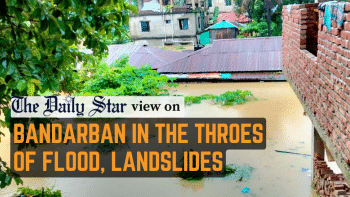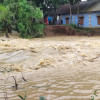Recent floods lay bare our vulnerabilities

As waters slowly begin to recede in the aftermath of heavy rains and flooding in Chattogram division over the past week, we are only just coming to terms with the devastation left in its wake. Thousands of people are still without drinking water and electricity. Residents who were forced to evacuate their inundated neighbourhoods have returned to find their homes irreversibly damaged. The destruction of belongings and property means their livelihoods have also been put at risk. At least 282 kilometres of major roads have been damaged, as well as several parts of the under-construction Chattogram-Cox's Bazar rail line, meaning the Tk 15,000 crore project is now likely to be delayed.
By all accounts, it seems it will be a long time before there is any return to normalcy. According to reports, locals are still being forced to subsist on dry food and are struggling to find drinkable water. On top of that, mobile networks continue to be patchy in certain areas, making it all the more difficult to ensure that help reaches the most hard-hit. In the face of such hardship, we must ask: given that heavy rains, flooding and erratic weather patterns have become regular occurrences in the era of climate catastrophe, could the authorities not have been better prepared to deal with this most recent devastation?
We do not believe these latest events can simply be written off as just another case of extreme weather. For years, experts have warned against the environmental destruction of the hill districts, arguing that rampant deforestation, hill-cutting and the destruction of rivers and canals will make the area more vulnerable to disasters. Despite any number of pledges and climate plans, very little has been done to combat environmental degradation, and we have seen far too many cases of influentials profiting from it instead.
We have witnessed the same apathy in terms of water-logging issues. During the latest floods, at least 40 percent of Chattogram city was submerged. Over the years, relevant authorities have held numerous meetings and come up with many plans to deal with this regular waterlogging, but failed when it comes to implementation. The fact that in the last six years, only five out of 40 sluice gates that would have allowed for better water flow at canals have been built is testament to this.
The recent floods have painted a clear picture of what will continue to happen if we fail to implement policies to protect the environment and build greater climate resiliency. The authorities must act before it is too late.


 For all latest news, follow The Daily Star's Google News channel.
For all latest news, follow The Daily Star's Google News channel. 










Comments